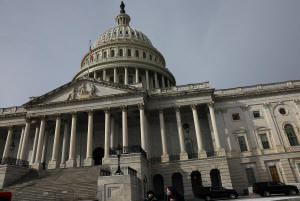US House panel advances $78 billion tax break bill in strong bipartisan
vote
 Send a link to a friend
Send a link to a friend
 [January 20, 2024]
WASHINGTON (Reuters) - U.S. lawmakers on Friday advanced a
bill to enhance tax breaks for businesses and low-income families in a
strong show of bipartisan support for the largely revenue-neutral
measure, despite their deep divisions over federal spending levels. [January 20, 2024]
WASHINGTON (Reuters) - U.S. lawmakers on Friday advanced a
bill to enhance tax breaks for businesses and low-income families in a
strong show of bipartisan support for the largely revenue-neutral
measure, despite their deep divisions over federal spending levels.
The House of Representatives Ways and Means Committee approved the
measure in a 40-3 vote, just three days after its Republican chairman
announced the deal with his Democratic Senate counterpart.
The "Tax Relief for American Families and Workers Act of 2024" would
increase the child tax credit and restore the full value of declining
business tax deductions for investments in research and development and
plant and equipment.
The changes would be effective through 2025, when Republican-passed tax
cuts for individuals expire and Congress is expected to embark on a
massive tax code revamp that will be hotly debated during this year's
presidential election campaign.
Democrats have been seeking to restore the full annual amount of a COVID-era
expansion of the child tax credit of up to $3,600 per child that expired
in 2021. Republicans, meanwhile, have been seeking to restore immediate
expensing of R&D and capital expenditures that were part of the
Republican-passed tax cuts in 2017 but began to phase out in 2022.
While the business tax breaks were restored in the deal, the child tax
credit expansions fell short, reaching only $2,000 per child in 2025.
The measure also includes tax breaks for affordable housing and people
hit by disasters, including wildfires and a train derailment in Ohio
last year.

[to top of second column]
|

People walk past the U.S. Capitol building as the deadline to avoid
partial government shutdown looms in Washington, U.S., January 18,
2024. REUTERS/Leah Millis/File Photo

Republican Ways and Means Committee Chairman Jason Smith, a
Republican, said the bill contains "common-sense fixes to the tax
code that will rebuild our communities, support better jobs and
wages, and grow our economy."
The Joint Committee on Taxation estimates that the measure will
increase U.S. deficits by $399 million over 10 years, with $77.5
billion in added costs offset by $77.1 billion in savings by beefing
up enforcement of fraudulent claims on the troubled COVID-era
Employee Retention Tax Credit and ending the processing of claims
early.
While the vote indicates strong congressional support for the
measure, including from Senate Majority Leader Charles Schumer, it
remains unclear whether it will move to the House floor as a
stand-alone bill or attached to other, "must-pass" fiscal
legislation.
The vote came after Congress late on Thursday averted a shutdown of
some government agencies with stopgap measures that buys just over a
month to reach an elusive deal on government funding for the fiscal
year that began on Oct. 1.
(Reporting by David Lawder; Editing Rosalba O'Brien)
[© 2024 Thomson Reuters. All rights reserved.]This material
may not be published, broadcast, rewritten or redistributed.
Thompson Reuters is solely responsible for this content. |